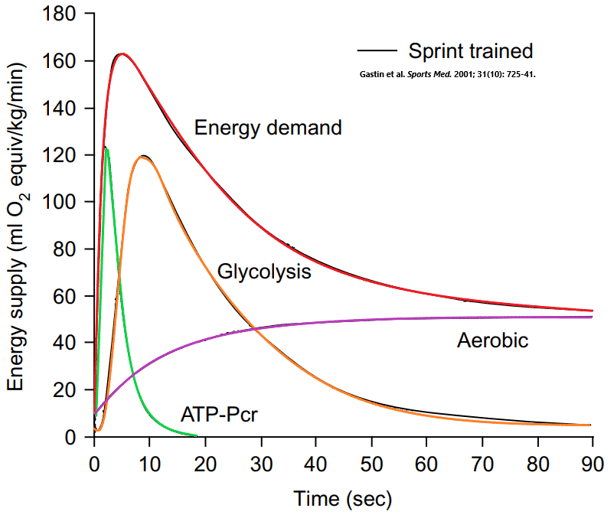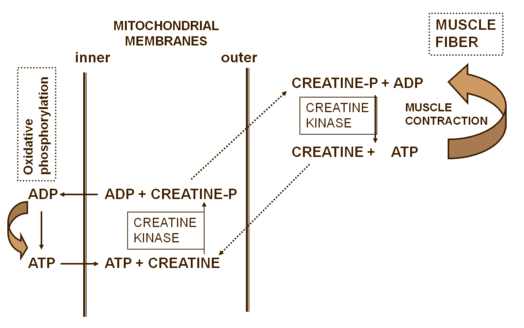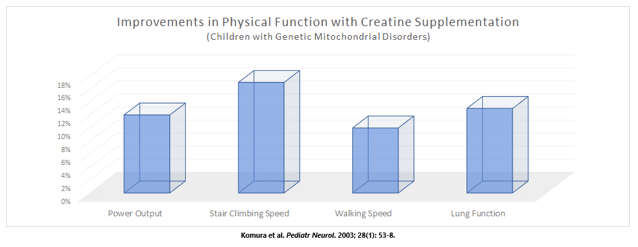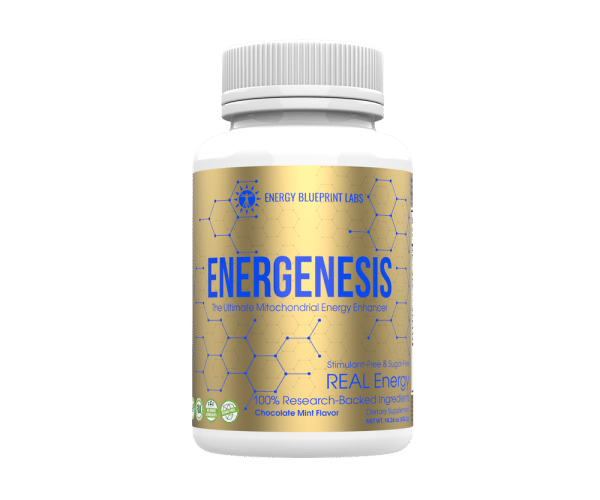We’re all familiar with the mitochondria, right? They’re the power plants of the body that produce most of the cellular energy, called ATP, that we need to function on a daily basis.
Now let me ask you something: where does the energy come from when you exert yourself?
Take a look at this graph. The red line represents the energy demand of cyclists who start sprinting as fast as they can on an exercise bike. See that purple line, that’s the energy produced by your mitochondria using oxygen. It takes at least 30 seconds of all-out exertion before mitochondria become the predominant energy suppliers.

Also notice how the energy production from mitochondria begins to taper off. Mitochondria can only produce energy so fast, and it takes time for them to start working at max capacity. So, let me ask you again, where does the energy come from when you exert yourself?
What about that orange line, which represents the breakdown of glucose without using oxygen or mitochondria. It’s certainly a more rapid and powerful method of energy production than mitochondrial respiration, but notice how it takes up to 10 seconds to kick into gear.
Instantaneous bursts of activity are fueled by creatine, the green line.
When you sprint, jump, lift heavy weights, or throw a punch, all these actions require substantially more energy than what we have available at rest. Those immediate energy demands are met by a molecule called phosphocreatine, which hangs out around muscle fibers to almost instantly replenish the ATP needed to fuel the activity.
The ability to replenish ATP is so efficient that intramuscular ATP concentrations remain almost unchanged during the first 10 seconds of all-out exertion [1,2]. Phosphocreatine produces energy 12 times faster than mitochondria [3], and the depletion of phosphocreatine is the entire reason your speed slows down and your strength declines after 5–10 seconds of going all-out.
It’s like gunpowder for your muscles: an explosion of energy that quickly disappears.
And muscle contractions aren’t the only cellular function reliant on creatine. Neurons require creatine to support their intense and fluctuating bursts of communication, with impairments in creatine metabolism linked to neurodegeneration [4].
Cellular growth and repair processes also need creatine to support energy demands, such as when your muscles become damaged from exercise or injury [5,6]. In fact, genetically altered mice that lack the ability to synthesize creatine experience substantial reductions in muscle size and strength compared to normal mice, effects that are completely reversed with creatine supplementation [7].

Creatine Increases Strength and Muscle Mass
So, what do you think happens to you if you’re running around with low levels of creatine? You can definitely expect to have less muscle, be weaker, and fatigue easier. How about the opposite: how do you think you’d feel if you maxed out your creatine stores?
Pretty good, right? Creatine is best-known for its ability to increase athletic performance and physical capability. Could you imagine experiencing a 5–15% increase in your strength and power output from a single supplement [8]? With creatine, that’s a reality.
To put this in context, one meta-analysis reported that creatine supplementation combined with a resistance training routine increased the maximum amount of weight people could squat by 22 lbs or 10 kg more than those just doing the training routine [9]. For bench press, creatine increased maximal strength by 15 lbs or 7 kg.
And yes, you can expect to see similar benefits if you are an older adult looking to fight back against sarcopenia and muscle loss with aging. A meta-analysis of 22 studies involving adults aged 57–70 years old reported that creatine supplementation significantly increased strength and lean body mass when accompanied by resistance training just 2–3 days per week [10].
And again, we know why these benefits are observed. By saturating creatine stores in your muscle tissue, you’ll have more phosphocreatine to rapidly resynthesize ATP as it is being used, meaning you have more energy available to fuel powerful muscle contractions when exerting yourself.
At this point, I think the necessity of creatine supplementation for maximizing muscular strength is apparent no matter where you’re at in your life journey. I want to spend the remainder of this article looking at the other ways creatine benefits health, particularly through protecting mitochondria and muscle tissue from damage.
Creatine Protects Muscles and Mitochondria
Creatine has been heavily investigated as a therapy for muscle wasting conditions like sarcopenia and myopathies [11,12]. While the ability to increase strength and power is one reason for its usefulness in these circumstances, creatine also has more subtle benefits on muscle tissue itself.
For example, sarcopenia and myopathies tend to have a strong underlying oxidative stress and inflammatory components that drive muscle breakdown [13]. As such, it’s notable that creatine has been shown to protect muscle fibers from high levels of oxidative stress and preserve their ability to grow and differentiate [14].
These protective effects were determined to be through several converging mechanisms [15]:
- Direct antioxidant activity
- Increased myogenic regulatory factor signaling
- Increased insulin-like growth factor (IGF-1) signaling
- Enhanced energy availability
- Mitochondrial protection
The authors of these discoveries later conducted a follow-up study focusing specifically on how creatine affects mitochondria under conditions of oxidative stress and found that it increased mitochondrial biogenesis, structural integrity, and function [16].
The impact of creatine on mitochondria may be one of its most underappreciated benefits. Aside from acting as an energy buffer during times of high energy demand, creatine also helps transport energy out of mitochondria and sensitize mitochondrial respiration to cellular energy requirements [17].
Our mitochondria produce phosphocreatine and export it into the cell to be available for use when energy demands outstrip what the mitochondria can make in a moment’s notice. Having more creatine available to be turned into phosphocreatine means that mitochondria have an easier time exporting any excess energy they may produce when the body doesn’t need it.

On top of that, higher levels of creatine sensitize mitochondria to the energy production signals, meaning that they will ramp up their energy production more effectively when faced with signals to do so [18]. In other words, creatine stimulates mitochondrial respiration.
This helps explain why creatine supplementation improves power output by an average of 12%, reduces the time it takes to climb a flight of stairs by 13%, and reduces the time it takes to run 30 feet by 10% in children with genetic mitochondrial disorders [19].

It also helps explain why several studies have found that creatine supplementation speeds recovery after muscle-damaging exercise, reduces the extent of muscle damage, and lessens the inflammatory fallout from a hard training session [20–22].
Creatine Protects the Brain
Earlier in this article, I mentioned that neurons rely on creatine to support their intense and fluctuating bursts of communication, with impairments in creatine metabolism linked to neurodegeneration. I want to end this article by briefly touching on that benefit.
Several studies have established that creatine supplementation increases brain creatine stores by 5–15% depending on concentrations before supplementation and the size of the person supplementing [23–25]. Through increasing the supply of readily available energy, acting as an antioxidant, and protecting against mitochondrial dysfunction, creatine could benefit numerous neurological disorders [26]:
- Alzheimer’s disease
- Parkinson’s disease
- Huntington’s disease
- Amyotrophic lateral sclerosis
- Stroke
- Brain injury
- Epilepsy
There’s also benefits towards cognitive function. For example, one study reported that creatine supplementation reduced mental fatigue and increased brain oxygen utilization when performing a repeated math calculation [27]. In another study, creatine supplementation improved working memory and processing speed [28].
Summary
Our bodies need creatine to act quickly. It’s an instantaneous source of energy that our muscles and nerves use when energy demand outstrips our mitochondria’s ability to make energy. By saturating creatine stores through supplementation, you’ll have more energy available to fuel powerful muscle contractions when exerting yourself.
Creatine also increases mitochondrial biogenesis, structural integrity, and function, which combines with its function as a readily available energy source to increase strength and power, protect against myopathies and muscle wasting, and improve cognitive function.
Overall, the science overwhelmingly shows that creatine monohydrate is a powerful performance-enhancing, energy-boosting, and muscle-protective supplement. That’s why we’ve made it one of the cornerstone ingredients in our mitochondrial energy formula, Energenesis.

References
- Gastin PB. Energy system interaction and relative contribution during maximal exercise. Sports Med. 2001;31:725–41.
- Baker JS, McCormick MC, Robergs RA. Interaction among Skeletal Muscle Metabolic Energy Systems during Intense Exercise. J Nutr Metab. 2010;2010:905612.
- Wallimann T, Wyss M, Brdiczka D, Nicolay K, Eppenberger HM. Intracellular compartmentation, structure and function of creatine kinase isoenzymes in tissues with high and fluctuating energy demands: the “phosphocreatine circuit” for cellular energy homeostasis. Biochem J. 1992;281 ( Pt 1):21–40.
- Andres RH, Ducray AD, Schlattner U, Wallimann T, Widmer HR. Functions and effects of creatine in the central nervous system. Brain Res Bull. 2008;76:329–43.
- O’Connor RS, Steeds CM, Wiseman RW, Pavlath GK. Phosphocreatine as an energy source for actin cytoskeletal rearrangements during myoblast fusion. J Physiol. 2008;586:2841–53.
- Saks V. The phosphocreatine-creatine kinase system helps to shape muscle cells and keep them healthy and alive. J. Physiol. 2008. p. 2817–8.
- Nabuurs CI, Choe CU, Veltien A, Kan HE, van Loon LJC, Rodenburg RJT, et al. Disturbed energy metabolism and muscular dystrophy caused by pure creatine deficiency are reversible by creatine intake. J Physiol. 2013;591:571–92.
- Kreider RB. Effects of creatine supplementation on performance and training adaptations. Mol Cell Biochem. 2003;244:89–94.
- Dempsey RL, Mazzone MF, Meurer LN. Does oral creatine supplementation improve strength? A meta-analysis. J Fam Pract. 2002;51:945–51.
- Chilibeck PD, Kaviani M, Candow DG, Zello GA. Effect of creatine supplementation during resistance training on lean tissue mass and muscular strength in older adults: a meta-analysis. Open Access J Sports Med. 2017;8:213–26.
- Dolan E, Artioli GG, Pereira RMR, Gualano B. Muscular Atrophy and Sarcopenia in the Elderly: Is There a Role for Creatine Supplementation? Biomolecules [Internet]. 2019;9.
- Kley RA, Tarnopolsky MA, Vorgerd M. Creatine for treating muscle disorders. Cochrane Database Syst Rev. 2013;CD004760.
- Meng S-J, Yu L-J. Oxidative stress, molecular inflammation and sarcopenia. Int J Mol Sci. 2010;11:1509–26.
- Sestili P, Barbieri E, Martinelli C, Battistelli M, Guescini M, Vallorani L, et al. Creatine supplementation prevents the inhibition of myogenic differentiation in oxidatively injured C2C12 murine myoblasts. Mol Nutr Food Res. 2009;53:1187–204.
- Sestili P, Barbieri E, Stocchi V. Effects of Creatine in Skeletal Muscle Cells and in Myoblasts Differentiating Under Normal or Oxidatively Stressing Conditions. Mini Rev Med Chem. 2016;16:4–11.
- Barbieri E, Guescini M, Calcabrini C, Vallorani L, Diaz AR, Fimognari C, et al. Creatine Prevents the Structural and Functional Damage to Mitochondria in Myogenic, Oxidatively Stressed C2C12 Cells and Restores Their Differentiation Capacity. Oxid Med Cell Longev. 2016;2016:5152029.
- Greenhaff PL. The creatine-phosphocreatine system: there’s more than one song in its repertoire. J. Physiol. 2001. p. 657.
- Walsh B, Tonkonogi M, Söderlund K, Hultman E, Saks V, Sahlin K. The role of phosphorylcreatine and creatine in the regulation of mitochondrial respiration in human skeletal muscle. J Physiol. 2001;537:971–8.
- Komura K, Hobbiebrunken E, Wilichowski EKG, Hanefeld FA. Effectiveness of creatine monohydrate in mitochondrial encephalomyopathies. Pediatr Neurol. 2003;28:53–8.
- Cooke MB, Rybalka E, Williams AD, Cribb PJ, Hayes A. Creatine supplementation enhances muscle force recovery after eccentrically-induced muscle damage in healthy individuals. J Int Soc Sports Nutr. 2009;6:13.
- Bassit RA, Pinheiro CH da J, Vitzel KF, Sproesser AJ, Silveira LR, Curi R. Effect of short-term creatine supplementation on markers of skeletal muscle damage after strenuous contractile activity. Eur J Appl Physiol. 2010;108:945–55.
- Santos RVT, Bassit RA, Caperuto EC, Costa Rosa LFBP. The effect of creatine supplementation upon inflammatory and muscle soreness markers after a 30km race. Life Sci. 2004;75:1917–24.
- Dechent P, Pouwels PJ, Wilken B, Hanefeld F, Frahm J. Increase of total creatine in human brain after oral supplementation of creatine-monohydrate. Am J Physiol. 1999;277:R698–704.
- Lyoo IK, Kong SW, Sung SM, Hirashima F, Parow A, Hennen J, et al. Multinuclear magnetic resonance spectroscopy of high-energy phosphate metabolites in human brain following oral supplementation of creatine-monohydrate. Psychiatry Res. 2003;123:87–100.
- Pan JW, Takahashi K. Cerebral energetic effects of creatine supplementation in humans. Am J Physiol Regul Integr Comp Physiol. 2007;292:R1745–50.
- Klein AM, Ferrante RJ. The neuroprotective role of creatine. Subcell Biochem. 2007;46:205–43.
- Watanabe A, Kato N, Kato T. Effects of creatine on mental fatigue and cerebral hemoglobin oxygenation. Neurosci Res. 2002;42:279–85.
- Rae C, Digney AL, McEwan SR, Bates TC. Oral creatine monohydrate supplementation improves brain performance: a double-blind, placebo-controlled, cross-over trial. Proc Biol Sci. 2003;270:2147–50.




